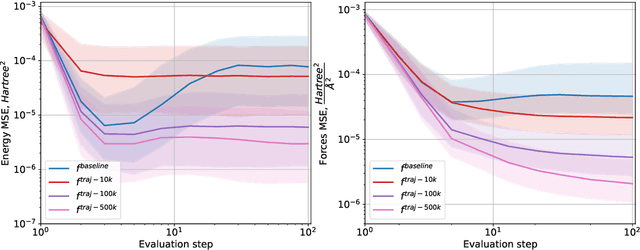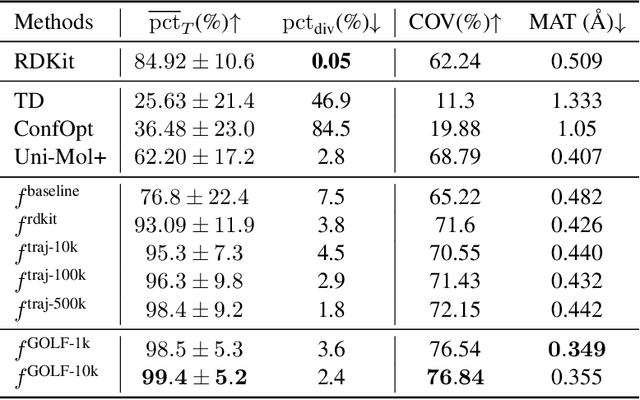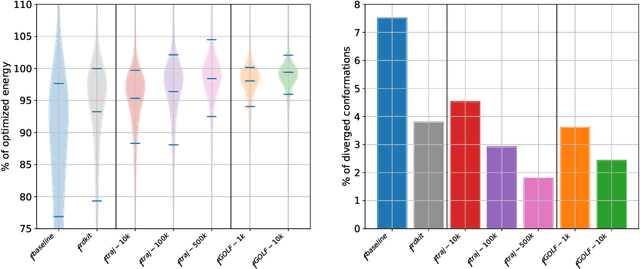Alexey Skrynnik
CoRL-MPPI: Enhancing MPPI With Learnable Behaviours For Efficient And Provably-Safe Multi-Robot Collision Avoidance
Nov 12, 2025Abstract:Decentralized collision avoidance remains a core challenge for scalable multi-robot systems. One of the promising approaches to tackle this problem is Model Predictive Path Integral (MPPI) -- a framework that is naturally suited to handle any robot motion model and provides strong theoretical guarantees. Still, in practice MPPI-based controller may provide suboptimal trajectories as its performance relies heavily on uninformed random sampling. In this work, we introduce CoRL-MPPI, a novel fusion of Cooperative Reinforcement Learning and MPPI to address this limitation. We train an action policy (approximated as deep neural network) in simulation that learns local cooperative collision avoidance behaviors. This learned policy is then embedded into the MPPI framework to guide its sampling distribution, biasing it towards more intelligent and cooperative actions. Notably, CoRL-MPPI preserves all the theoretical guarantees of regular MPPI. We evaluate our approach in dense, dynamic simulation environments against state-of-the-art baselines, including ORCA, BVC, and a multi-agent MPPI implementation. Our results demonstrate that CoRL-MPPI significantly improves navigation efficiency (measured by success rate and makespan) and safety, enabling agile and robust multi-robot navigation.
CrafText Benchmark: Advancing Instruction Following in Complex Multimodal Open-Ended World
May 17, 2025Abstract:Following instructions in real-world conditions requires the ability to adapt to the world's volatility and entanglement: the environment is dynamic and unpredictable, instructions can be linguistically complex with diverse vocabulary, and the number of possible goals an agent may encounter is vast. Despite extensive research in this area, most studies are conducted in static environments with simple instructions and a limited vocabulary, making it difficult to assess agent performance in more diverse and challenging settings. To address this gap, we introduce CrafText, a benchmark for evaluating instruction following in a multimodal environment with diverse instructions and dynamic interactions. CrafText includes 3,924 instructions with 3,423 unique words, covering Localization, Conditional, Building, and Achievement tasks. Additionally, we propose an evaluation protocol that measures an agent's ability to generalize to novel instruction formulations and dynamically evolving task configurations, providing a rigorous test of both linguistic understanding and adaptive decision-making.
MAPF-GPT: Imitation Learning for Multi-Agent Pathfinding at Scale
Aug 29, 2024Abstract:Multi-agent pathfinding (MAPF) is a challenging computational problem that typically requires to find collision-free paths for multiple agents in a shared environment. Solving MAPF optimally is NP-hard, yet efficient solutions are critical for numerous applications, including automated warehouses and transportation systems. Recently, learning-based approaches to MAPF have gained attention, particularly those leveraging deep reinforcement learning. Following current trends in machine learning, we have created a foundation model for the MAPF problems called MAPF-GPT. Using imitation learning, we have trained a policy on a set of pre-collected sub-optimal expert trajectories that can generate actions in conditions of partial observability without additional heuristics, reward functions, or communication with other agents. The resulting MAPF-GPT model demonstrates zero-shot learning abilities when solving the MAPF problem instances that were not present in the training dataset. We show that MAPF-GPT notably outperforms the current best-performing learnable-MAPF solvers on a diverse range of problem instances and is efficient in terms of computation (in the inference mode).
POGEMA: A Benchmark Platform for Cooperative Multi-Agent Navigation
Jul 20, 2024Abstract:Multi-agent reinforcement learning (MARL) has recently excelled in solving challenging cooperative and competitive multi-agent problems in various environments with, mostly, few agents and full observability. Moreover, a range of crucial robotics-related tasks, such as multi-robot navigation and obstacle avoidance, that have been conventionally approached with the classical non-learnable methods (e.g., heuristic search) is currently suggested to be solved by the learning-based or hybrid methods. Still, in this domain, it is hard, not to say impossible, to conduct a fair comparison between classical, learning-based, and hybrid approaches due to the lack of a unified framework that supports both learning and evaluation. To this end, we introduce POGEMA, a set of comprehensive tools that includes a fast environment for learning, a generator of problem instances, the collection of pre-defined ones, a visualization toolkit, and a benchmarking tool that allows automated evaluation. We introduce and specify an evaluation protocol defining a range of domain-related metrics computed on the basics of the primary evaluation indicators (such as success rate and path length), allowing a fair multi-fold comparison. The results of such a comparison, which involves a variety of state-of-the-art MARL, search-based, and hybrid methods, are presented.
Instruction Following with Goal-Conditioned Reinforcement Learning in Virtual Environments
Jul 12, 2024



Abstract:In this study, we address the issue of enabling an artificial intelligence agent to execute complex language instructions within virtual environments. In our framework, we assume that these instructions involve intricate linguistic structures and multiple interdependent tasks that must be navigated successfully to achieve the desired outcomes. To effectively manage these complexities, we propose a hierarchical framework that combines the deep language comprehension of large language models with the adaptive action-execution capabilities of reinforcement learning agents. The language module (based on LLM) translates the language instruction into a high-level action plan, which is then executed by a pre-trained reinforcement learning agent. We have demonstrated the effectiveness of our approach in two different environments: in IGLU, where agents are instructed to build structures, and in Crafter, where agents perform tasks and interact with objects in the surrounding environment according to language commands.
IDAT: A Multi-Modal Dataset and Toolkit for Building and Evaluating Interactive Task-Solving Agents
Jul 12, 2024



Abstract:Seamless interaction between AI agents and humans using natural language remains a key goal in AI research. This paper addresses the challenges of developing interactive agents capable of understanding and executing grounded natural language instructions through the IGLU competition at NeurIPS. Despite advancements, challenges such as a scarcity of appropriate datasets and the need for effective evaluation platforms persist. We introduce a scalable data collection tool for gathering interactive grounded language instructions within a Minecraft-like environment, resulting in a Multi-Modal dataset with around 9,000 utterances and over 1,000 clarification questions. Additionally, we present a Human-in-the-Loop interactive evaluation platform for qualitative analysis and comparison of agent performance through multi-turn communication with human annotators. We offer to the community these assets referred to as IDAT (IGLU Dataset And Toolkit) which aim to advance the development of intelligent, interactive AI agents and provide essential resources for further research.
Decentralized Monte Carlo Tree Search for Partially Observable Multi-agent Pathfinding
Dec 26, 2023Abstract:The Multi-Agent Pathfinding (MAPF) problem involves finding a set of conflict-free paths for a group of agents confined to a graph. In typical MAPF scenarios, the graph and the agents' starting and ending vertices are known beforehand, allowing the use of centralized planning algorithms. However, in this study, we focus on the decentralized MAPF setting, where the agents may observe the other agents only locally and are restricted in communications with each other. Specifically, we investigate the lifelong variant of MAPF, where new goals are continually assigned to the agents upon completion of previous ones. Drawing inspiration from the successful AlphaZero approach, we propose a decentralized multi-agent Monte Carlo Tree Search (MCTS) method for MAPF tasks. Our approach utilizes the agent's observations to recreate the intrinsic Markov decision process, which is then used for planning with a tailored for multi-agent tasks version of neural MCTS. The experimental results show that our approach outperforms state-of-the-art learnable MAPF solvers. The source code is available at https://github.com/AIRI-Institute/mats-lp.
Gradual Optimization Learning for Conformational Energy Minimization
Nov 05, 2023



Abstract:Molecular conformation optimization is crucial to computer-aided drug discovery and materials design. Traditional energy minimization techniques rely on iterative optimization methods that use molecular forces calculated by a physical simulator (oracle) as anti-gradients. However, this is a computationally expensive approach that requires many interactions with a physical simulator. One way to accelerate this procedure is to replace the physical simulator with a neural network. Despite recent progress in neural networks for molecular conformation energy prediction, such models are prone to distribution shift, leading to inaccurate energy minimization. We find that the quality of energy minimization with neural networks can be improved by providing optimization trajectories as additional training data. Still, it takes around $5 \times 10^5$ additional conformations to match the physical simulator's optimization quality. In this work, we present the Gradual Optimization Learning Framework (GOLF) for energy minimization with neural networks that significantly reduces the required additional data. The framework consists of an efficient data-collecting scheme and an external optimizer. The external optimizer utilizes gradients from the energy prediction model to generate optimization trajectories, and the data-collecting scheme selects additional training data to be processed by the physical simulator. Our results demonstrate that the neural network trained with GOLF performs on par with the oracle on a benchmark of diverse drug-like molecules using $50$x less additional data.
Learn to Follow: Decentralized Lifelong Multi-agent Pathfinding via Planning and Learning
Oct 02, 2023



Abstract:Multi-agent Pathfinding (MAPF) problem generally asks to find a set of conflict-free paths for a set of agents confined to a graph and is typically solved in a centralized fashion. Conversely, in this work, we investigate the decentralized MAPF setting, when the central controller that posses all the information on the agents' locations and goals is absent and the agents have to sequientially decide the actions on their own without having access to a full state of the environment. We focus on the practically important lifelong variant of MAPF, which involves continuously assigning new goals to the agents upon arrival to the previous ones. To address this complex problem, we propose a method that integrates two complementary approaches: planning with heuristic search and reinforcement learning through policy optimization. Planning is utilized to construct and re-plan individual paths. We enhance our planning algorithm with a dedicated technique tailored to avoid congestion and increase the throughput of the system. We employ reinforcement learning to discover the collision avoidance policies that effectively guide the agents along the paths. The policy is implemented as a neural network and is effectively trained without any reward-shaping or external guidance. We evaluate our method on a wide range of setups comparing it to the state-of-the-art solvers. The results show that our method consistently outperforms the learnable competitors, showing higher throughput and better ability to generalize to the maps that were unseen at the training stage. Moreover our solver outperforms a rule-based one in terms of throughput and is an order of magnitude faster than a state-of-the-art search-based solver.
Monte-Carlo Tree Search for Multi-Agent Pathfinding: Preliminary Results
Jul 25, 2023Abstract:In this work we study a well-known and challenging problem of Multi-agent Pathfinding, when a set of agents is confined to a graph, each agent is assigned a unique start and goal vertices and the task is to find a set of collision-free paths (one for each agent) such that each agent reaches its respective goal. We investigate how to utilize Monte-Carlo Tree Search (MCTS) to solve the problem. Although MCTS was shown to demonstrate superior performance in a wide range of problems like playing antagonistic games (e.g. Go, Chess etc.), discovering faster matrix multiplication algorithms etc., its application to the problem at hand was not well studied before. To this end we introduce an original variant of MCTS, tailored to multi-agent pathfinding. The crux of our approach is how the reward, that guides MCTS, is computed. Specifically, we use individual paths to assist the agents with the the goal-reaching behavior, while leaving them freedom to get off the track if it is needed to avoid collisions. We also use a dedicated decomposition technique to reduce the branching factor of the tree search procedure. Empirically we show that the suggested method outperforms the baseline planning algorithm that invokes heuristic search, e.g. A*, at each re-planning step.
 Add to Chrome
Add to Chrome Add to Firefox
Add to Firefox Add to Edge
Add to Edge